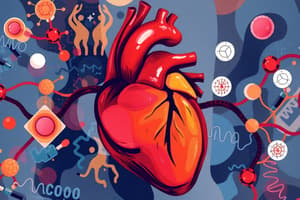Podcast
Questions and Answers
What do positive inotropic drugs do?
What do positive inotropic drugs do?
- Increase heart rate by altering impulse formation at the SA node
- Decrease the conduction of electrical impulses
- Increase the force of myocardial contraction (correct)
- Decrease the force of myocardial contraction
What is the effect of negative chronotropic drugs?
What is the effect of negative chronotropic drugs?
- Decrease the conduction of electrical impulses
- Increase heart rate by altering impulse formation at the SA node
- Decrease heart rate by altering impulse formation at the SA node (correct)
- Increase the force of myocardial contraction
What is the primary effect of catecholamines?
What is the primary effect of catecholamines?
- Increase blood glucose levels and decrease heart rate
- Increase heart rate and constrict peripheral blood vessels (correct)
- Decrease blood glucose levels and increase heart rate
- Decrease heart rate and dilate peripheral blood vessels
What do antiarrhythmic drugs aim to correct?
What do antiarrhythmic drugs aim to correct?
What is quinidine?
What is quinidine?
Flashcards are hidden until you start studying
Study Notes
Cardiac Medications
- Positive inotropic drugs: Increase the force of contraction of the heart muscle, resulting in a stronger heartbeat.
- Negative chronotropic drugs: Decrease the heart rate, slowing down the heartbeat.
- Catecholamines: Have a primary effect of increasing the force and rate of the heartbeat, preparing the body for "fight or flight" responses.
- Antiarrhythmic drugs: Aim to correct abnormal heart rhythms, restore a normal heart rhythm and prevent irregular heartbeats.
- Quinidine: A type of antiarrhythmic drug, used to treat abnormal heart rhythms, including atrial fibrillation.
Studying That Suits You
Use AI to generate personalized quizzes and flashcards to suit your learning preferences.




